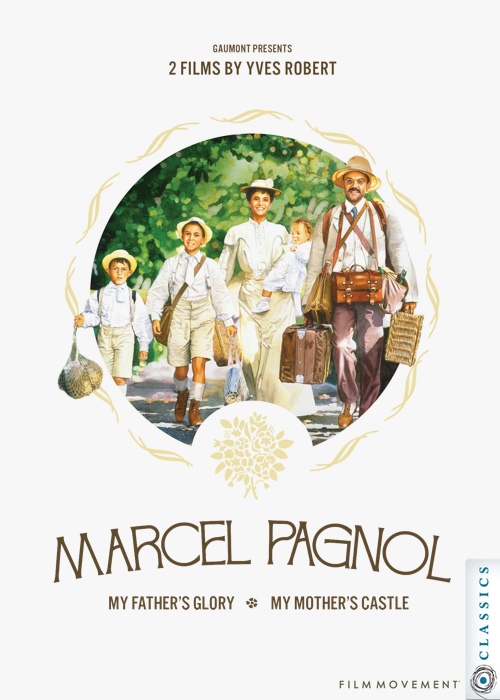Marcel Pagnol: My Father's Glory, My Mother's Castle

Based on the bestselling memoirs of French novelist, playwright, and filmmaker Marcel Pagnol (the acclaimed author of Jean de Florette and Manon of the Spring), MY FATHER’S GLORY and its sequel MY MOTHER’S CASTLE recount the nostalgic memories of Pagnol’s youth growing up in Provence at the turn of the twentieth century. During one idyllic summer, 11-year-old Marcel (Julien Ciamaca) discovers friendship and wonder amid the rocky peaks surrounding his family’s countryside home while learning new respect for his gentle and caring schoolmaster father Joseph (Philippe Caubère). Upon his return to Marseilles, Marcel longs to escape back to his beloved hills and is granted his wish when his adoring mother Augustine (Nathalie Roussel) devises a plan that allows them to visit the cottage more frequently.
ABOUT MARCEL PAGNOL
“In Marseille, I am still a child, in Paris, I am old..." Marcel Pagnol was born in Aubagne, at 16 cours Barthélémy, a few kilometers from Marseille where he soon moved with his parents. He spent his entire childhood and adolescence there and studied at Thiers high school. During the vacations, his father rented, with Uncle Jules, a house in the hills, the famous “Bastide Neuve” beyond the small village of La Treille. Marcel remained a Marseillais at heart.
Appointed teacher in Paris, a few years later, he wrote his first successful plays there. Thus “exiled” in the capital, he found and described Marseille in “MARIUS“. Marcel Pagnol lived in Paris on several occasions. But cinema brought him back to the South of France and to his “dear hills”. As early as the 1930s, he set up his laboratories and then his film studios in Marseille.
In 1941, he wanted to create a Cité du Cinéma in the region and bought the Château de la Buzine. He recognized it as the castle of “fear” that he would later evoke in the second volume of his “Childhood Memories”, “The Castle of my Mother."
He also bought the Étoile estate, in La Gaude, near Cagnes, in order to start “intensive carnation cultivation” in 1941 and to avoid the STO (Servive du Travail Obligatoire) for the technicians of his studios, which were sold to Gaumont. Thereafter, he spent most of his vacations with his family.
At the end of the war, he retired for a while to his property in the Sarthe region, to the Ignières mill, which he sold in the late fifties. In order to shoot “The Beautiful Miller’s Wife” with Jacqueline Pagnol and Tino Rossi, Pagnol acquired an old mill in “La Colle-sur-Loup” in the Nice hinterland. As early as 1926, Marcel fell in love with the Principality of Monaco. In 1951, he decided to settle in Monte-Carlo with his friend Prince Rainier. He bought “La Lestra”, a magnificent 19th century villa located near the bay. Marcel, Jacqueline, Frédéric and Estelle lived there happily until early 1954. “It was the most beautiful time of our life” wrote Pagnol. Then, recalled by the Academy, Pagnol returned to Paris and opened offices on rue Fortuny.
He lived on rue Jean Goujon, and soon acquired a private mansion in the square of avenue Foch. It was there that he lived with Jacqueline for the rest of his life.
Cast
- Philippe Caubère
- Nathalie Roussel
- Didier Pain
- Thérèse Liotard
- Julien Ciamaca
- Victorien Delamare
Blu-ray Features
Bonus Features:
Heritage and Nostalgia video essay by Ludovic Cortade, Associate Professor in French Literature, Thought and Culture at New York University
A Question of Tribe featurette with director Yves Robert’s son Jean-Denis Robert, grandson Martin Drescher, and cinematographer Robert Alazraki
16-page booklet with new essay by filmmaker, producer and writer Kat Ellinger
Discs: 1
- "What is surprising about the two films is the way they creep up on you emotionally, until at the end of the second one, when we discover the meaning of the movie’s title, there is a deeply moving moment of truth and insight. Like all the best movies, these memories of Marcel Pagnol work by becoming our memories, as well."
- "With beauty, simplicity, and a keen appreciation for the commonplace, director Yves Robert captures the turn-of-the-century childhood of Marcel...."
- "MY FATHER'S GLORY is the first of Yves Robert's two charming movies based on the sweet reminiscences of Marcel Pagnol.... The film proves exceptional in every way: outstanding cinematography that captures the countryside of Provence, fitting musical score, and wonderful acting performances."
- "And now here we are back again in the hills of Provence, in the second of two remarkable memory-films based on the childhood of the great French writer Marcel Pagnol. It is likely that no one, not even Pagnol, had a childhood quite this perfect, and yet all happy childhoods grow happier in memory, and it is the nature of film that we can share some of Pagnol's happiness."
- "Whatever the interval that separates one's viewing of "My Father's Glory" from that of the equally enchanting "My Mother's Castle," it is only an intermission. This second film, like the first, is raised to the heights of voyeuristic pleasure by countless family feasts, happy occasions, warm smiles and intoxicating memories. "My Mother's Castle," a film that is all banquets and bouquets, concentrates as fully on life's smaller joys as on its larger ones, and does so with the kind of panache that has already charmed much of France. "
- "My Mother's Castle maintains an enchantment that paints across its canvas with lyrical watercolor swirls."
- "Robert catches the book’s reverie, its wistful tenderness. "
Gallery
Awards & Recognition
Best Film
Seattle International Film Festival
Best Foreign Film
National Board of Review
Best Supporting Actress
César Awards
Best Music
César Awards
Most Promising Actor
César Awards
Best Costume Design
César Awards
Best Foreign Language Film
Chicago Film Critics Assoc. Awards
